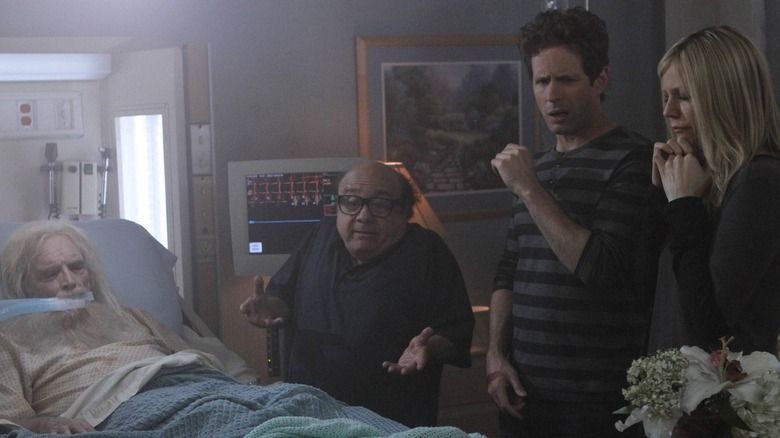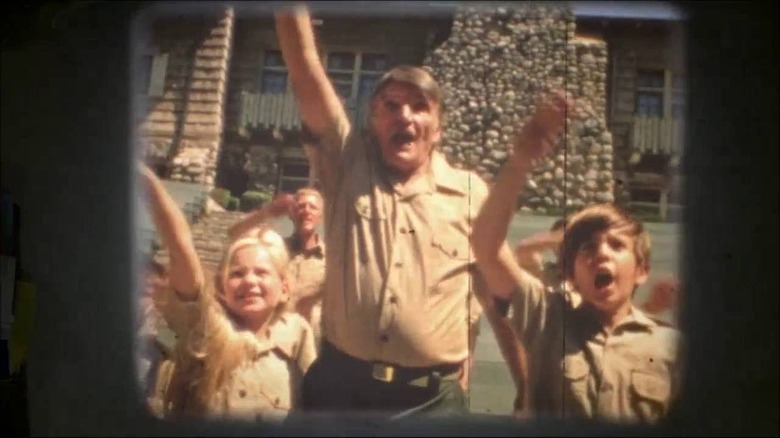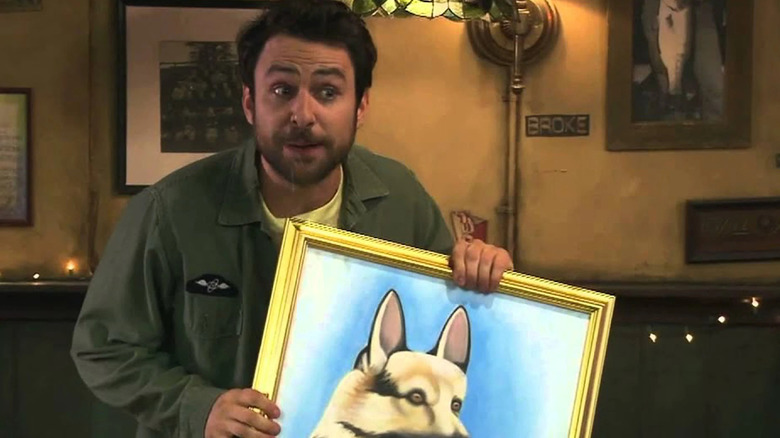It's Always Sunny's Season 8 Euthanasia Episode Came From A Serious, Real Life Conversation
They say that great art is often inspired by the artist's life, and "Always Sunny" has given us plenty of examples of this. Season 8's "Pop-Pop: The Final Solution" is a story about euthanasia that was inspired by the writers' own conflicting thoughts on the topic. As co-creator Rob McElhenney (who plays Mac) explained in a 2012 interview, "[The episode] was sparked somewhat by a conversation [sic] that I was having with Kaitlin [Olson, who plays Dee] where we were fast-forwarding in our lives, and trying to figure out if one of us was on life-support—those are conversations that we have to have."
Unlike the episode itself, this was a serious issue for the couple. "What do we want? Do we want to be DNR? Do we want to be hooked up forever?" McElhenney explained. "We were having that conversation and I brought it up in the writer's room and then that's what sparked the conversation and we started thinking; okay, now, how can we do an episode about this?"
So came a storyline about Dennis (Glenn Howerton) and Dee's grandfather, Pop-Pop. The character is on life support and it's now up to his grandchildren (his sole living heirs, if you ignore Donna and Gail the Snail) to decide whether or not to pull the plug. Dennis and Dee handle this difficult decision with all the grace and maturity we've come to expect from them. By which I mean, they make their decision solely based on what benefits them and will make them look good.
Dennis and Dee, maybe not the best to handle this situation
For the Reynolds siblings, there are plenty of factors at play here. On the pro-death side of things, they stand to get some sort of inheritance if Pop-Pop dies. It also helps(?) that the guy was a Nazi, not just during the war but long after, even bringing Dennis and Dee to a Hitler Youth camp when they were children. This is a big point in the pro-euthanasia direction, as the siblings would prefer to kill off any memory of their shameful past.
But on the other hand, they don't love the idea of actively murdering someone, even if it's technically a good cause. They seriously consider euthanizing a dog at a local animal shelter first (to see how they feel about it), but can't quite go through with it. In a classic "Always Sunny" joke, it's later revealed that the dogs they let loose from the pound went on to bite a bunch of people and get put down anyway. Dennis and Dee's self-serving idea of kindness didn't actually help anyone.
Luckily, the perpetually-annoyed lawyer (just known throughout the show as The Lawyer, played by Brian Unger) is there to make the Reynolds' decision for them. Dennis and Dee try to act like their hands are entirely clean, until the doctor compliments The Lawyer's decision to pull the plug, and then the siblings immediately switch their tune and try to claim credit. It's shamelessly self-serving and shallow behavior, and perfectly in line with the characters throughout the rest of the show.
Taking the seriousness out of a serious question
Euthanasia has always been a bit of a hot-button issue, for obvious reasons. To pull the plug on a loved one is a difficult, emotional decision not to be made lightly. That's why it's so funny to see the "Always Sunny" gang look at Pop-Pop's death purely in terms of what they could get out of it. While Dennis and Dee struggle to figure out which decision makes them look the most like good people, Frank, Charlie, and Mac spend their time chasing after Pop-Pops' hidden Nazi treasure. The question over what's best for Pop-Pop, or what he deserves, is rendered completely irrelevant by the selfishness of the gang.
It's an approach that "Always Sunny" has taken to pretty much every other serious issue, be it abortion rights, gun rights, the Me Too movement, and so on. Whereas shows like "South Park" only manage to take the veneer of an apolitical, "make fun of everyone equally" approach, "Always Sunny" genuinely avoids any preachiness. It avoids a stance on major issues not out of cowardness, but by trusting its audience to know that everything its characters do and say is shallow, self-serving nonsense. Any point the characters make about a social/political issue is not a reflection on this issue itself; it's a reflection on the depravity and ignorance of those characters. There is no voice of reason character on "It's Always Sunny in Philadelphia," and we wouldn't have it any other way.


